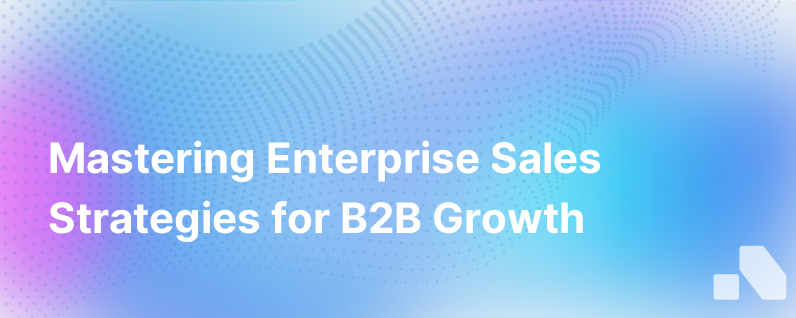
B2B enterprise sales is a complex, high-stakes game that demands a deft combination of strategy, skill, and patience. In the B2B space, particularly when dealing with large enterprises, sales cycles can be protracted, and the decision-making process involves multiple stakeholders with varying needs and concerns. To navigate this intricate landscape and drive long-term growth effectively, sellers must innovate and adapt continuously. Here, we explore the bedrock strategies essential for mastering enterprise sales in the B2B arena.
Understanding the Enterprise Sales Landscape
The enterprise sales arena is markedly distinct from other forms of sales because of its scale, complexity, and the bespoke nature of deals. The process typically involves numerous layers, from initial lead generation to the closing handshake – or these days, a digital nod. Nurturing a lead through this journey requires a profound understanding of an organization's unique challenges and an ability to articulate value propositions effectively and convincingly.
Precise targeting and personalized approach are the linchpins of enterprise sales. A successful salesperson views each prospect not as a transaction but as a long-term partnership. This perspective necessitates a comprehensive, customer-first strategy that hinges on several pillars.
The Pillars of Mastering Enterprise Sales
1. Cultivate Robust Customer Relationships
Winning business from large organizations begins and ends with relationships. Sales professionals must invest time and effort to understand prospects – their industry, company culture, and specific pain points. Relationship building in the B2B space often transcends the individual, requiring you to form connections with multiple stakeholders across different levels of the target business.
2. Implement Consultative Selling
In the complex landscape of enterprise sales, the consultative approach is king. Salespersons who function as trusted advisors rather than mere vendors position themselves as indispensable problem-solvers. They delve deeper into understanding client processes, offering recommendations attuned to the enterprise's nuanced needs and driving conversations that resonate with C-suite executives.
3. Leverage Technology and Data
Technologies such as Customer Relationship Management (CRM) systems and Artificial Intelligence (AI) provide a significant edge. Advanced analytics and AI can shed light on buyer behaviors and preferences, enabling predictive and prescriptive insights. Integrated sales platforms like Aomni streamline the sales process by offering real-time account research, which can be vital in customizing interactions and offerings.
4. Foster Sales and Marketing Alignment
A unified front between sales and marketing teams can significantly amplify enterprise sales effectiveness. Marketing can provide invaluable ammunition to sales through targeted content and lead nurturing campaigns, which warm up prospects before sales engagement. Furthermore, feedback from sales to marketing can refine targeting and messaging, creating a virtuous cycle of improvement.
5. Embrace Sales Enablement Tactics
Sales enablement is about equipping sales teams with the tools, content, and knowledge necessary to sell more effectively. This includes access to up-to-date competitive insights and personalized sales content, training on best practices, and sharing success stories. Continuous learning and adaptation are key tenets here, ensuring that the sales strategy evolves with the market.
Navigating Challenges and Obstacles
While the opportunities in enterprise B2B sales are significant, so too are the challenges. Long sales cycles, rigorous vetting processes, and intense competition make successful deal closure a formidable task. Overcoming these hurdles requires:
- Patience and persistence, as building consensus and navigating corporate bureaucracy takes time.
- A thorough understanding of the competing solutions and an ability to articulate your differentiators clearly.
- An ongoing service approach, ensuring that promissory notes delivered in the sales process are fulfilled post-sale.
Crafting a Future-Proof Strategy
Looking ahead, B2B enterprise sales strategies must integrate flexibility to accommodate shifting market dynamics and buyer preferences. As more and more enterprises seek digital transformations, sellers can expect to work closely with tech-savvy buyers who demand sophisticated, seamless buying experiences.
Innovation will continue to be a watchword in the enterprise sales space, with advancement in tech empowering sales teams and altering how relationships are cultivated. Sales professionals must stay informed and agile to adapt to these changes.
As a sales leader or team member, you should utilize tools like Aomni to support these complex endeavors. The platform can aid in accumulating actionable insights, providing personalized sales content speedily, and simplifying the research process – all essential facets for a modern approach to B2B enterprise sales.
In the end, mastering B2B enterprise sales is an exercise in concerted effort, strategy, and continual learning. With an unyielding focus on value delivery, customer understanding, and leveraging technology, B2B sellers can excel in this intricate domain, driving both immediate wins and sustained commercial growth.
Sources:
- Mastering B2B Enterprise Sales: 4 Strategies to Focus your B2B Sales Team
- Five Ways to Build Effective B2B Sales Teams
- Future of B2B sales: The big reframe
- HOW TO BUILD A B2B SALES TEAM STRUCTURE
- B2B Sales Trends 2023 | 6 Emerging Major Trends That Will Drive B2B Sales Growth
- 12 Proven B2B Sales Strategies To Win More Customers
- 13 Top B2B Sales Trends to Watch This Year (2024)
- 5 Trends Shaping B2B Sales in 2023